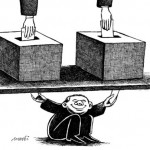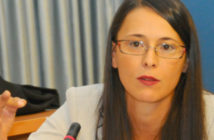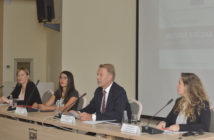 (Podgorica, 5 November 2012) – MANS today released the results of its report into abuses of state resources during the 2012 parliamentary elections in Montenegro. The lack of clarity and the considerable ambiguity in the Law on the Financing of Political Parties has enabled an environment in which the majority of violations of the law are not sanctioned. Both the State Electoral Commission (DIK) and the State Auditing Agency (DRI) claim that they are not responsible for implementation, while the State Prosecutor’s office has only accepted responsibility for cases relating to excessive expenditures of budgetary resources (though without any concrete convictions handed down).
(Podgorica, 5 November 2012) – MANS today released the results of its report into abuses of state resources during the 2012 parliamentary elections in Montenegro. The lack of clarity and the considerable ambiguity in the Law on the Financing of Political Parties has enabled an environment in which the majority of violations of the law are not sanctioned. Both the State Electoral Commission (DIK) and the State Auditing Agency (DRI) claim that they are not responsible for implementation, while the State Prosecutor’s office has only accepted responsibility for cases relating to excessive expenditures of budgetary resources (though without any concrete convictions handed down).
Many offences related to the abuse of state resources for electoral purposes are treated as breaches of the law in the current party financing legislation. For most of these offences monetary fines are prescribed, while some of the more egregious violations are to be punished with prison sentences. Since there are no clear criteria, and prosecution depends on the will of existing institutions, there is sufficient discretion that enables one violator to be fined and another to end up in jail for the same offence.
In analyzing the central electoral rolls, MANS established problems with over 25,000 registered voters (that is roughly 5% of the total number of registered voters). Information we obtained indicates that the same persons were registered in the electoral rolls several times, while those who lack residency in Montenegro have the right to vote, as do many deceased individuals. In light of the elections only a small number of the irregularities we noted were corrected, while the responsible institutions initiated proceedings against MANS (and not the individuals responsible for compiling faulty electoral lists).
A number of state institutions increased their budgetary spending fare beyond their normal spending, even though the law explicitly bars such expenditures. Concrete examples demonstrate that during the elections substantial sums were set aside for the poorest segments of the population – especially for those who haven’t been able to realize their rights for years – while individual citizens publicly stated that assistance is being given only to political loyalists.
Private companies that have been receiving large public tenders for years, were given substantial donations to the state during the election campaign, thus factually assisting the ruling coalition and thereby circumventing the restrictions in the party financing law.
Government functionaries permanently and intensively were abusing state resources to promote their political parties through official visits to local municipalities. They violated a range of laws while attending ribbon cutting ceremonies for incomplete infrastructural projects, whose use can violate the security and lives of citizens (while concrete examples demonstrate that in this way they influenced the eventual decisions of voters).
Many institutions hired new employees during the election campaign, including the most senior levels of the state. Examples we’ve uncovered also demonstrate that pressure was exerted on those working in public institutions and state companies – as well as in some private companies – to vote for the ruling coalition.
The problem of paid advertising during the election campaign wasn’t as pronounced as some other violations, other than when it came to the Internet portal Analitika. The majority of institutions hid information on the waste of budgetary resources during the pre-election campaign, thereby violating the Law on Free Access to Information, which prevented us from uncovering the extend to which tax payer moneys were abused.
The enclosed report was submitted today to the delegation of the European Union in Podgorica, to the ambassadors of EU member states and the USA, as well as the delegations of the UN and OSCE in Montenegro. The report will, after being translated into English, be submitted to the European Commission as well as other EU institutions (as well as all of MANS’ contacts abroad).



